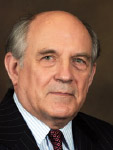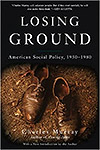The Volunteer Who Initiated Critical National Discussions — Charles Murray (Thailand)
by Jeremiah Norris (Colombia 1963-65)
•
 Charles Murray served as a Peace Corp Volunteer in Thailand, beginning in 1965, then stayed abroad for six years. He credits his time in Peace Corps with his lifelong interest in Asia. His tenure with the Peace Corps ended in 1968. Recalling his time in Thailand, in 2014 Charles noted that his worldview was fundamentally shaped by his time there. He went on to comment:
Charles Murray served as a Peace Corp Volunteer in Thailand, beginning in 1965, then stayed abroad for six years. He credits his time in Peace Corps with his lifelong interest in Asia. His tenure with the Peace Corps ended in 1968. Recalling his time in Thailand, in 2014 Charles noted that his worldview was fundamentally shaped by his time there. He went on to comment:
. . . most of what you read in my books I learned in Thai villages. I was struck first by the enormous discrepancy between what Bangkok thought was important to the villagers and what the villagers wanted out of government. Secondly, when the government change agent showed up, the village went to hell in terms of its internal governance.
His work in Peace Corps and subsequent research in Thailand for research firms associated with the U. S. Government led to the subject of his doctoral thesis in political science at M. I. T. in which he argued against bureaucratic intervention in the lives of Thai villagers.
Murray’s tenure with Peace Corps ended in 1968 and during the remainder of his time in Thailand he worked for the American Institutes for Research (AIR). Returning home, Murray continued his research work at AIR, one of the largest of the private social science research organizations, from 1974 to 1981. Eventually, he became its chief political scientist, supervising evaluations in the fields of urban education, welfare services, daycare, adolescent pregnancy, services for the elderly, and criminal justice.
 From 1981 to 1990, Murray was a Fellow with the Manhattan Institute, where he wrote Losing Ground: American Social Policy 1950-80, [Basic Books 1984]which heavily influenced the welfare reform debates in 1996. In it, he argued that social welfare programs actually hurt society as a whole, as well as the very people those programs were trying to help. He concluded that these programs should therefore be eliminated.
From 1981 to 1990, Murray was a Fellow with the Manhattan Institute, where he wrote Losing Ground: American Social Policy 1950-80, [Basic Books 1984]which heavily influenced the welfare reform debates in 1996. In it, he argued that social welfare programs actually hurt society as a whole, as well as the very people those programs were trying to help. He concluded that these programs should therefore be eliminated.
Since 1990, Murray has been a Fellow of the American Enterprise Institute (AEI). Here, he, along with his co-author, Harvard Professor Richard Herrnstein, they published what became a very controversial book: The Bell Curve: Intelligence and Class Structure in American Life [Free Press 1996]. Its title comes from the bell-shaped normal distribution of IQ scores. Its central thesis is that in American society in the 20th century, intelligence had become a better predictor of many factors, including financial income, job performance, unwed pregnancy, and crime, than one’s parents’ socio-economic status or education level. The book also argued that those with high IQs were becoming separated from those with average and below-average intelligence and that this constituted a dangerous social trend. They also warned of a merger of the “cognitive elite” with the “wealth elite,” which would become increasingly isolated and could result in an authoritarian “custodial state.”
In that book, the authors debated about whether and how much genes and environment have to do with ethnic differences and remain unresolved, and that it seemed highly likely that both genes and the environment have something to do with racial differences. But, this stands in contrast to the contemporary and subsequent consensus of mainstream researchers who do not find that racial disparities in educational attainment or measured intelligence are explained by between-group genetic differences. After its publication, various academics criticized the book, some said it supported long-discredited “scientific racism.” Among them, one came from an academic of unimpeachable reputation, the internationally celebrated evolutionary biologist Stephen Jay Gould who addressed the subject in his aptly titled book: The Mismeasure of Man.
Murray has published articles in The New Republic; Commentary; The Public Interest; The New York Times; The Wall Street Journal; National Review; and The Washington Post. In the July 13, 2007 issue of The American, published through AEI, Murray said that he has changed his mind about SAT tests and now believes that they should be scrapped, saying: “Perhaps the SAT has made an important independent contribution to predicting college performance in earlier years, but by the time research was conducted in the last half of the 1990s, the test had already been ruined by political correctness”.
Murray’s publications over the decades since his Peace Corps service in Thailand never failed to attract critical attention, both within academic and governmental circles, often resulting in the publication of many books by highly acclaimed authors to rebut, for instance, The Bell Curve, earning him a richly deserved Profile in Citizenship.
During the 1930’s Nazis were also vfery interested in racial ehnic differences. The result was their concept of the Master Race.
Thank you for that acute observation, Lawrence. Murray’s research and conclusion in the Bell Curve have been widely criticized, by other researchers/
You can see what Charles Murray told college students about the Peace Corps at the American Enterprise Institute on Youtube. Google ‘Charles Murray, A Curmudgeon’s Guide to Getting Ahead.” It’s a fifty-minute presentation.
Thank you.